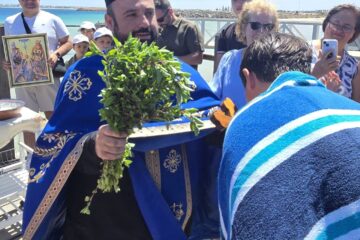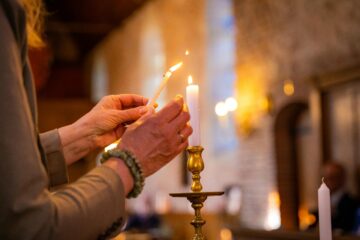Protopresbyter Georgios Dorbarakis
‘Even in the world, if Christians undertake the struggle with good intentions, God’s grace doesn’t exclude anyone. But, ‘excusing ourselves through excuses’ we say that we’re in the world and we can’t do anything. Desires defeat us. What do we need? This struggle, not only of the body but also of the spirit. In other words, we have to govern our thoughts. Thoughts come, the fanciful imaginings of sin, images, people, idols and scenes. We should expel them immediately with ‘Lord, Jesus Christ, have mercy on me’. When the mind is vigilant, it doesn’t welcome any of these things and is armed with the Name of Christ; then every enemy of our soul is slain, be it the devil, disgusting fantasies, or profane thoughts. Then, when we guard our soul, our mind and our heart in this way, we’ll keep our inner being clean and pure’ (Elder Efraim Filotheïtis).
The late blessed Elder Efraim Filotheïtis (or ‘Arizon[i]an’, as he’s sometimes called)*, stresses that Holy Scripture constantly declares, and our Holy Church ceaselessly preaches through the Fathers, that God is love which extends to all people everywhere, offering grace and excluding no-one. It’s clear that the holy elder isn’t talking about the grace that sustains and maintains all things which exist and have their being – because, as the source of life, God gives everything the chance to exist and be: people, animals, plants and everything he created from non-being. The Elder means the deifying grace which only those who believe in and have welcomed Christ into their life can possess and increase. Such people are Christians who have become members of Christ through his living body, the Church. They experience this grace which has no end and which allows them to progress ever onwards until they attain ‘the whole measure of the fullness of Christ’.
So, whether a Christian is a monastic or someone living in the world, they have the same opportunities and the same prospects. All that’s required is the necessary premise God always asks of us: that we should want him in our life. Or, as Elder Efraim puts it: ‘we should undertake the struggle with good intentions’.
What exactly is this struggle, according to the late Elder? The bodily struggle, clearly, with fasting and other ascetic practices as determined by the Church, depending on the way of life of the Christian concerned. And the spiritual, by guarding the mind and heart, that is our inner world, from whatever sin and malice may defile it. The cleanliness and purity of the soul is the main thing to be sought, according to the holy Elder, and rightly so: the Lord blessed the pure in heart, because it’s they who have experience of God: ‘Blessed are the pure in heart, for they will see God’. And this vigilance and care which preserve purity have to do mostly with the struggle for control over thoughts and thinking, over the vile imaginings which come either from the Evil One himself or from our passions, our egotism and the offshoots thereof. This battle for control of our thoughts is promoted by the tradition of the Church and the science of the spiritual life, without knowledge of which we’re unable to make progress or become sanctified.
The Elder also notes that Christians have a powerful weapon, a ‘divine armament’ in this battle: the Name of Christ. ‘Lord Jesus Christ, have mercy on me’. Believing Christians turn to the Lord when they’re under attack from bad thoughts; they fight back with love, invoking their Father, disdaining any other things that wish to invade their heart and thinking. Is this not what vigilance means? Exclusive adherence to the Lord, observance of the commandment: ‘You shall love the Lord your God with all your soul and heart’. And the result: ‘every enemy of our soul is slain, be it the devil, disgusting fantasies, or profane thoughts’. The soul creates the climate and the context in which the Creator himself can come and dwell.
In the end, why don’t we Christians respond to the magnificent prospect Christ has ordained for us? Because, according to Elder Efraim, we’re defeated by what we want. And we make excuses for our weakness; we have no difficulty in justifying ourselves all the time. In reality, we understand full well: behind every refusal to follow the Lord lies a lack of love for him on our part. Whenever we resort to bemoaning our weakness, it means we have greater love- perhaps it’s even exclusive- for ourselves and our passions. As Saint Païsios the Athonite used to say: ‘There isn’t any “I can’t”. There’s “I don’t want to”. And there’s “I don’t want to”, because I don’t love’.
*If, God willing, the Elder is canonized his title could be ‘Saint Efraim in Arizona’, after the model of saints such as ‘Dionysios in Olympus’ or ‘Anthimos in Chios’. ‘Of Arizona’ would be wrong, because he wasn’t the Bishop of Arizona.
Source: pemptousia.com




0 Comments